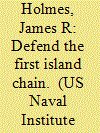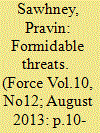| Srl | Item |
| 1 |
ID:
130061


|
|
|
|
|
| Publication |
2014.
|
| Summary/Abstract |
A strategic solution to the troubled waters of the Western Pacific is perimeter defense-but what kind? History offers options.
Want to give China an ulcer, a nagging sore that compels Beijing to think twice about aggression? Then look at the map. Geography affords the U.S.-Japan alliance abundant opportunities to make trouble for the People's Liberation Army (PLA), denying China's military access to the vast maneuver space of the Western Pacific while hampering its movements up and down the Asian seaboard. Fortifying the offshore island chain while deploying naval assets in adjoining waters could yield major strategic gains on the cheap. Doing so is common sense. The only question is how.
|
|
|
|
|
|
|
|
|
|
|
|
|
|
|
|
| 2 |
ID:
126122


|
|
|
|
|
| Publication |
2013.
|
| Summary/Abstract |
China does not need to go to war with India. Pakistan, at present, is satisfied with its strategy of proxy war against India. However, a limited two-front war into the future started by Pakistan in Northern Kashmir (Siachen) is not ruled out; Chinese involvement in it will be indirect with its asymmetrical capabilities. India's political and military leadership, unfortunately, has shown little appreciation of what it may be up against.
China accomplished the incredible by its three-week intrusion in April 2013 in Northern Ladakh against India. With mere 30 border guards, it did successful military coercion resulting in a total capitulation of India's political leadership. This showed a lack of understanding in Delhi of Chinese diplomacy where counter-coercion does not necessarily translate into war. Moreover, China which is pitted against the US for supremacy in Asia would stay away from a border war with India. However, its coercive diplomacy, especially one achieved with minimal show of strength, has provided numerous strategic gains to Beijing.
|
|
|
|
|
|
|
|
|
|
|
|
|
|
|
|
| 3 |
ID:
179951


|
|
|
|
|
| Summary/Abstract |
Since the launch of the Maritime Silk Road Initiative (MSRI), observers have witnessed the consolidation of a growing Chinese presence in ports around the Indian Ocean Region (IOR). This growing presence has caused alarm among skeptics who view the MSRI as a second coming of the String of Pearls (SoP). Indeed, China is seen as leveraging MSRI port investments in return for national strategic and geopolitical gain, such as ultimately gaining a military foothold in MSRI ports. Regardless of China’s purported intent, this paper seeks to add nuance to this debate by examining whether Beijing can actually achieve such strategic gains in the IOR via the deployment of its economic statecraft (via MSRI investments). As the paper shows, the MSRI’s current rollout – as well as the inherent resistance to the strategic dimensions of this rollout – offer little in the way of empirical support to the SoP concept.
|
|
|
|
|
|
|
|
|
|
|
|
|
|
|
|